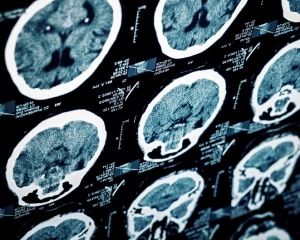 A Traumatic Brain Injury (TBI) is a severe, debilitating, and often deadly injury that inflicts trauma upon the brain. This type of injury often results from various types of accidents, including car, truck, and motorcycle crashes, as well as slips and falls. TBIs are sometimes difficult to detect, especially when the trauma does not involve an obvious collision to the head. However impact to the head can produce bleeding in the brain, a fractured skull, or a coma, which are certain evidences of TBI.
A Traumatic Brain Injury (TBI) is a severe, debilitating, and often deadly injury that inflicts trauma upon the brain. This type of injury often results from various types of accidents, including car, truck, and motorcycle crashes, as well as slips and falls. TBIs are sometimes difficult to detect, especially when the trauma does not involve an obvious collision to the head. However impact to the head can produce bleeding in the brain, a fractured skull, or a coma, which are certain evidences of TBI.
Mild brain injuries, although less severe than TBI, should also be taken seriously. These injuries, although not directly life-threatening, can occur by the same means that cause TBI and produce debilitating effects on a person’s cognitive, physical, and emotional capabilities. If these injuries are not treated properly or ignored, they can grow more problematic over time.
According to Center for Disease Control (CDC) statistics, in 2013 alone, there were more than 282,000 hospitalizations and 2.5 million ER visits due to traumatic brain injury. As well, this type of brain trauma contributed to the death of nearly 50,000 people.
Minor traumatic brain injury (MTBI)
One of several conditions must exist in order to have a valid diagnosis of MTBI. These include:
- Confusion or disorientation
- Neurological or neuropsychological difficulties
- Amnesia beginning near the time of the injury
- A Glasgow Coma Scale (GCS) score of 13 or higher
Symptoms of traumatic brain injury
Physical symptoms of traumatic brain injury can include headaches, blurred vision, loss of vision, and dizziness. Cognitive symptoms of TBI can include disorientation, short-term memory loss, poor concentration, and amnesia.
In addition to physical and cognitive symptoms, a person may experience emotional symptoms from TBI including: depression, change in appetite, irritability, agitation, and general personality changes.
TBI does not require head impact
In a recent study carried out by Ezriel Kornel, M.D., F.A.C.S., and Michael Freeman, Ph.D, more than 20 percent of cases showed that whiplash produced brain injury, an event that is often experienced by vehicle occupants during car and motorcycle collisions. In the study, the type of brain injury often manifested was a hernia in the brain, also referred to as Chiari Malformation. The injury involves the bottom portion of the brain protruding through the base of the skull.
The rapid acceleration and deceleration forces involved in a whiplash incident can cause serious brain injury as the brain impacts the opposite side of the skull.
Types of traumatic brain injuries
- Violent shaking of the head, impacts to the head, and whiplash movements can all result in concussion.
- Resulting from direct impact to the head, a contusion usually involves serious bruising or bleeding in the brain. Contusions can occur to the brain tissue itself, referred to as a cerebral contusion. Large or serious contusions often require surgery.
- Coup-contracoup. If two contusions occur (one on each side of the brain), it is referred to as a Coup-Contracoup. The initial impact to the head produces the first contusion. As the brain impacts the other side of the skull, the second contusion occurs.
- Diffuse axonal injury. When a person is involved in an accident that involves intense twisting or shaking of the head, the brain may lag behind the movement of the skull, resulting in portions of the brain tearing. This is referred to as Diffuse Axonal Injury. This injury is severe and can lead to death. The shaking of the brain can disrupt nerve cells and limit the ability of the cells to send messages to the body.
- A brain injury that involves penetration occurs when some portion of the skull is forced into the brain. This injury can occur due to a stabbing or gunshot wound, or penetration from any other sharp object, and can be fatal.
- Hematoma or blood clot. A blood clot or hematoma can involve a mass of blood or swelling between the brain and the skull. Some cases may have the blood mass or swelling occurring inside the brain.
In some cases, CT scans and MRIs can fall short in providing the evidence required to conclusively diagnose a TBI. Some insurance adjusters may attempt to deny an insurance claim for traumatic brain injury that involves whiplash. These insurance practitioners may have the mistaken assumption that the head must experience impact in order for the person to incur brain trauma.
For these reasons it’s important to obtain help from an experienced traumatic brain injury attorney who is familiar with the medical science explaining these injuries, their causes and treatments.
If you have experienced a traumatic brain injury due to the negligence or fault of another party, our attorneys at Delius & McKenzie, PLLC are committed to helping you obtain the compensation you deserve. We serve clients in Sevierville, Pigeon Forge, Seymour, and Gatlinburg. Let’s talk about your situation. To schedule a free case evaluation, please call us today at 865-428-8780 or fill out our contact form.

Attorney Bryce W. McKenzie received his JD from University of Tennessee College of Law, and has been a clerk for the Court of Criminal Appeals. He is admitted in Tennessee, Federal Court, and the US Court of Appeals. Read more about Bryce W. McKenzie.




